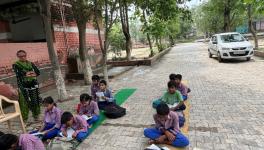‘Chakka Jam’ by Farmers Against New Farm Laws Targets Corporate Houses

New Delhi: Farmer outfits across the country have intensified their agitation against the controversial farm laws by blocking state and national highways for four hours – from 12 noon to 4 p.m – on Thursday, in a protest that saw heavy sloganeering against some corporate giants.
Called by All India Kisan Sangharsh Coordination Committee (AIKSCC), a coming together of more than 250 farmers’ organisations from almost all states, the demonstrations were staged as part of their next phase of struggle that is set to conclude on November 26-27, when a countrywide call to march to the national capital has been given. The farmers march will coincide with a general strike call on November 26 by 10 central trade unions against the new labour laws among other demands.
The protests have been triggered by the agriculture ‘reforms’ that were steamrolled through Parliament recently by the Narendra Modi government, as the farmers feel that these would tilt the playing field in favour of corporate houses.
As a result, Thursday’s protests saw farmers venting their ire against corporate giants in the field, particularly in Punjab and Haryana – the two states at the forefront of the agitation.
Farmer leaders said big corporate houses would directly benefit by the new farm legislations, and also named some industrialists who had ‘close proximity’ to the Bharatiya Janata Party (BJP) government as the major gainers.
In Punjab, roads leading to two silos belonging to a Gujarat-based corporate house – at Moga and Sangrur districts – were blocked by farmers led by Bharatiya Kisan Union (BKU) - Ekta Ugrahan, one of the largest farm bodies in the state. “A 24x7 dharna is being staged outside both the facilities since many weeks now; today, we will block the roads at both the places”, Gardev Singh of BKU - Ekta Ugrahan told NewsClick.
Singh named two industrialists “close” to the Prime Minister Narendra Modi and said they would stand to be greatly “favoured” by the new farm laws. “Look at how the country is being sold to these both, who are now controlling every sector,” he said, adding, “this will be the fate of the farmers also, who will always be at the mercy of these corporates.”
The Moga facility was designated as a notified government purchasing mandi earlier in 2008 by the Prakash Singh Badal government. Even though farmers contend a good price for selling their produce here now, they fear its discontinuance once the state-run mandis are finished off.
Elsewhere in Punjab, petrol pumps run by the Reliance group along with its retail chains and other private toll plazas witnessed demonstrations, a BKU – Ekta Ugrahan leader from Bhatinda said. “There 37 other sites across the state, where road traffic was blocked,” he added.
Likewise, blockades were also witnessed near two private thermal plants in the state – at Banawala village in Mansa district and at Rajpura in Patiala district. While the former is operated by a subsidiary of Vedanta, the latter is a wholly-owned subsidiary of L&T Power Development Limited.
Coal supplies to these two thermal plants have been hit for many days now, reportedly due to the ‘rail roko’ agitation at Jandiala Guru railway station in Amritsar district, that is still being staged by at least one farmers’ body namely, Kisan Mazdoor Sangharsh Committee. The agitations began at more than 30 railway track sites in the month of September.
Satnam Singh Pannu, general secretary of the committee, told Newsclick that a final decision to lift the dharna would be taken in a meeting scheduled for Thursday evening. As part of the national protest call, the body is also staging ‘chakka jam’ of national highways at 45 sites in the state.
“We will allow the goods trains to run on tracks – if Centre continues the services – however, we will not allow passenger trains in the state for now,” Pannu said over the phone.
Thursday marks the 14th day of disruption of goods trains, which is now leading to squeezing of essential supplies in the state. The Centre has maintained that allowing even goods trains in such a situation – when farmers continue to squat near rail tracks – would be difficult, even as the Railways continue to register losses.
Incidentally, barring one, all organisations have already agreed to leave the railway station premises, where protests were earlier staged. The leaders of these organisations have accused the Centre of stopping supplies to Punjab.
Punjab was the first state government, followed by Rajasthan, to bring in legislations negating the Central farm laws. The three state Bills are currently awaiting approval from the Governor, and thereafter the President. The latter has allegedly refused appointment to a delegation led by Punjab Chief Minister Amarinder Singh, forcing him to stage a relay “dharna” at Delhi’s Rajghat on Wednesday.
Meanwhile, protests on Thursday were staged in Haryana. Sumit Singh, general secretary, Haryana’s chapter of All India Kisan Union (AIKS) said private toll plazas at Sirsa and Khuian Malkana saw major demonstrations, joined by as many as 35 farmers’ organisations in the state.
“Farmers also thronged to two petrol pumps run by Reliance in Fatehabad district. In total, there were 15-16 protest sites today,” Singh told NewsClick.
Gurnam Singh Charuni, chief of BKU – Charuni, said his organisation was leading demonstrations at 20 to 25 sites. “Traffic will be blocked at all of these sites. However, we have decided to give free passage to ambulances or any vehicle carrying sick persons.”
Farmers’ groups in Haryana in a joint move have also given a call to gherao Chief Minister Manohar Lal Khattar’s residence at Karnal on November 9.
Interestingly, the arhtiyas’ associations in Haryana, which had partook in earlier protests against farm laws, were absent this time. “These are the days of peak business transactions, and we don’t want to miss it; we have extended our moral support to the farmers,” Harsh Girdhar, vice president, Haryana State Anaj mandi Arhtiyas Association, said.
Protests by farmers were also reported from Maharashtra, Gujarat, Karnataka, Tamil Nadu, West Bengal, Jharkhand, Uttar Pradesh among others.
“Reports of a successful protest programme are still coming in from different corners of the country. In a broader sense, we can say that road blockades were witnessed at about 2,500 sites spreading across 15 to 16 states,” Avik Saha, national general secretary, Swaraj India, a constituent of AIKSCC, told Newsclick.
Get the latest reports & analysis with people's perspective on Protests, movements & deep analytical videos, discussions of the current affairs in your Telegram app. Subscribe to NewsClick's Telegram channel & get Real-Time updates on stories, as they get published on our website.
























